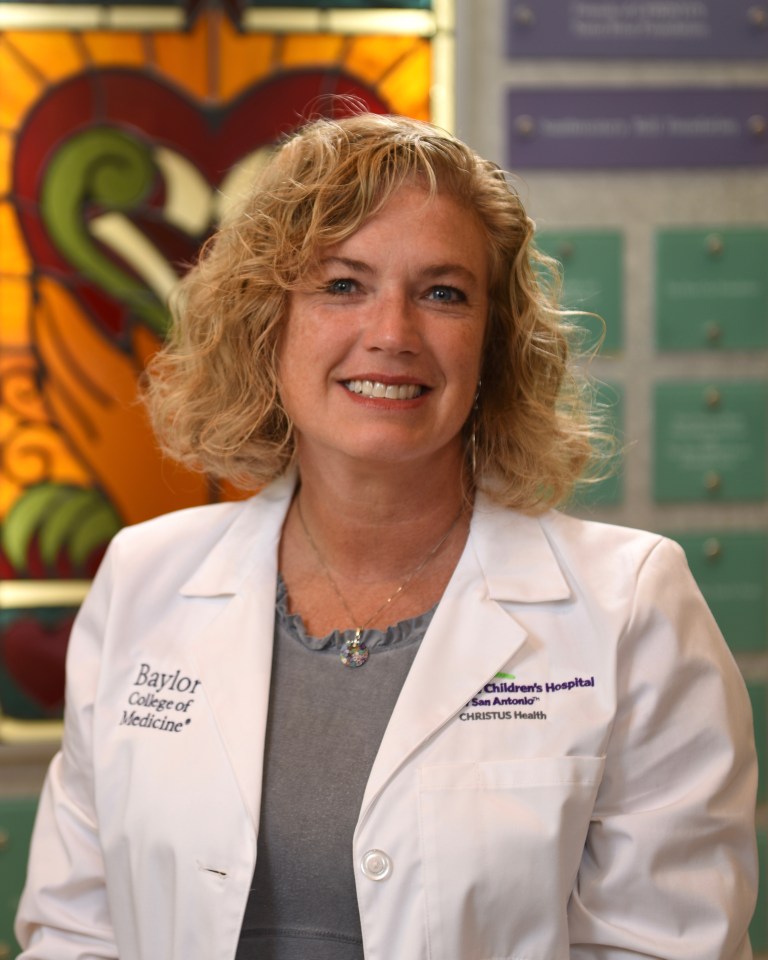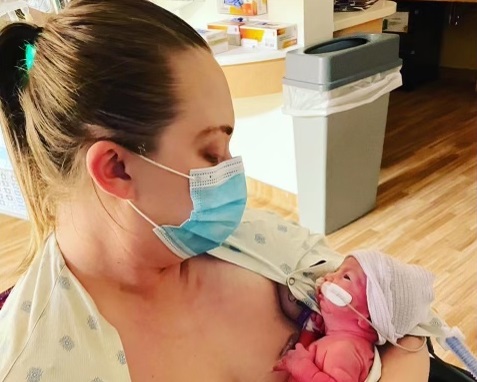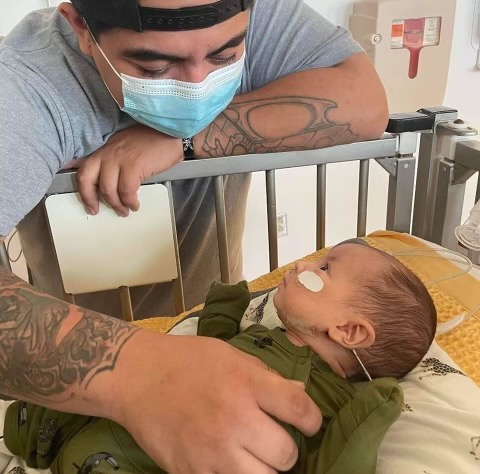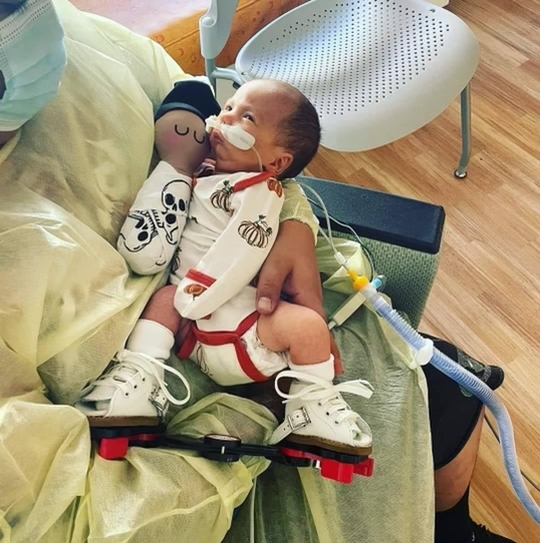A Smile To Treasure
Emily Garcia and her husband were surprised and excited about adding a fourth child to their growing family. They wanted to pick a unique name for this child and decided to name him River upon learning they would be having a boy.
“One day, I was going through a list of names and stumbled upon ‘River,'” said Emily. “I thought it was different, and it just stuck.”
No stranger to high-risk pregnancies due to her high blood pressure and gestational diabetes, Emily made an appointment with her obstetrician, Dr. Tracy Lyon at CHRISTUS Women’s Health associated with CHRISTUS Children’s. When Emily was about 12 weeks along, Dr. Lyon detected on the ultrasound that River’s chin was tiny and pushed back. And at the 20-week mark, they also discovered that River had a clubfoot, a birth defect that affects muscles and bones in a baby’s feet, making their foot (or both feet) point down and in.

“I was super emotional because I had never dealt with anything like that with my previous pregnancies,” said Emily. “But my husband and I decided to take it one day at a time and deal with whatever came our way.”
Doctors recommended that Emily undergo an amniocentesis, a procedure where a small sample of amniotic fluid is taken to be tested for any abnormalities that might have caused River’s small chin and clubfoot. Everything came back negative.
Doctors wanted to keep a close eye on River and scheduled weekly ultrasounds for Emily to check on his progress.
The remainder of Emily’s pregnancy was uneventful until she hit 35 weeks and started feeling a little “off” and suspected that her blood pressure was high. She decided to take it, and sure enough, it was. She waited an hour or so to see if her medicine made a difference and when it didn’t, she called her doctor.
After doctors put her on a different medication and placed an IV, Emily’s blood pressure was still elevated. So, the doctors prepared her for a C-section.
Once they delivered River, doctors discovered that in addition to the small chin and clubfoot, he also had a cleft palate, a condition where the roof of the mouth does not fuse completely during pregnancy.
“The doctors attending River’s delivery were super concerned about him, so they took him to the neonatal intensive care unit (NICU) immediately after he was born,” said Emily.
Because Emily was given magnesium to help her recover from her C-section, she could not see River right away.
When she finally did get to see River, he was doing well. He could breathe on his own, which was a good sign. Dr. Maria Pierce, River’s primary physician in the NICU, told Emily that as he grew, River’s need for supplemental oxygen may increase, which it eventually did.

As with most NICU babies, River’s journey in the NICU was somewhat of a rollercoaster, but through it all, the team at CHRISTUS Children’s kept Emily, and her husband updated every step of the way.
“I had a lot of communication with Dr. Pierce and some of the other physicians. They were always so helpful and understanding. It was a constant ‘two steps forward, one step backward’ scenario,” said Emily.
River was having some issues eating and, as a result, had trouble gaining weight. When he would try to eat, his heart rate would drop, which was somewhat concerning. After the speech pathologist conducting a swallow test, together with River’s doctors they pinpointed precisely what he needed to help him eat.
When he was about six weeks old and after he had gained some weight, River reached the point where he could have his jaw distraction surgery. Dr. Alejandra Garcia de Mitchell, his plastic surgeon, and her team carefully positioned plates in his jaw and little pins behind his ears. Every day, the doctors would turn the pins to help push his jaw forward.
“In a side-by-side comparison of what River looked like before surgery and what he looked like afterward, it was an amazing transformation,” said Emily. “He looks like a completely different baby.”

In total, River spent 70 days in the NICU at CHRISTUS Children’s.
As for his clubfoot, Dr. Elizabeth Magnabosco, an orthopedic surgeon with Baylor College of Medicine at CHRISTUS Children’s, is treating it with ‘casting’ and his foot has slowly started to turn in the correct position. Dr. Magnabosco is also using the “boots and bars” mechanism, where boots and bars are used to stabilize the muscles and ligaments and prevent them from tightening up.

When River finally was able to go home, Emily and her husband were excited but also a bit overwhelmed. Before they left the hospital, they needed to know everything necessary to care for River at home. And they needed to be prepared to keep track of his many doctor’s appointments, including setting up physical therapy for his foot and face. He also needed to have the distractors removed, a procedure he recently had done.
Emily and her family are immensely grateful to the team at CHRISTUS Children’s for taking such great care of River, especially the plastic surgery team.
“The plastic surgery team made my life 10 times better. He’s able to do so much more than I ever thought he’d be able to do because of them,” said Emily. “They brightened the outlook for my son and increased his quality of life.”
The nursing team also made a significant impact on River and his family. There are two in particular that come to mind – Kim and Alison.
“Kim went above and beyond for us as far as River was concerned. She always took care of us and made sure we always knew what was going on,” said Emily. “And Alison took care of River during the night and was super helpful in making sure he was always fed, which could be complicated at times.”
The only surgery ahead of him is the procedures to correct his cleft palate. When he is a little older, Dr. Garcia de Mitchell will perform the surgery to repair his cleft palate in two stages. The first stage will be to correct his soft palate when he is about a year old, and the second phase to correct his hard palate will occur when he’s between 15 and 18 months old.
In the meantime, River is reaching some key milestones. He loves to be held, enjoys his swing, and has started to smile and even talk a little.
“There were times when I wasn’t sure we would ever see him smile,” said Emily. “Now, when he does, it means the world to me.”
